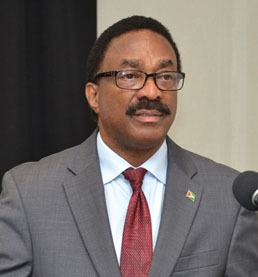As promised, Attorney General (AG) Basil Williams SC has filed a cross appeal in the challenge to the Chief Justice’s ruling on the elections recount, citing the same grounds listed by the applicant, Misenga Jones.
In his notice of continuation for acting Chief Justice Roxane George-Wiltshire’s decision to be varied, Williams, who wants the ruling validating the recount order to be set aside, argues that contrary to the judge’s pronouncements, this issue has not previously been dealt with.
According to him neither the Guyana Court of Appeal nor the Caribbean Court of Justice (CCJ) have dealt with this issue before and so there is no such decision by which the Chief Justice could have been said to be bound by.
As a result, he wants her ruling that the principles of res judicata (a thing, matter, or determination that is adjudged or final) and stare decisis (stand by what has already been decided) bind her to be set aside.
At 10 am today, the local appellate court will commence hearing arguments in Jones’ case, which challenges the High Court’s decision upholding the validity of the national recount of votes from the March 2 polls.
Among other things, Jones’ appeal contends that Justice George-Wiltshire erred in law in her pronouncements on the recount, the results of which she said is the only data that could be used by the Guyana Elections Commission (GECOM) to declare a winner of the elections in keeping with a judgment by the CCJ.
Jones is challenging the validity of Order 60, which facilitated the recount.
As Jones also contends in her appeal, Williams wants the court to set aside the Chief Justice’s findings that that Section 18 of Election Laws (Amendment) is not in conflict, or tension, with Article 177 of the Constitution, and that it does not breach the separation of powers doctrine and that it is accordingly not unconstitutional.
Another ground on which Williams’ appeal is based, as is Jones’, is the assertion that it is the declarations made by the 10 Returning Officers (ROs) for each of the 10 electoral districts to the Chief Election Officer (CEO) that ought to be used to declare a winner of the elections and not the recount’s results.
According to Williams, contrary to the High Court’s ruling, it is not presently incompetent for the CEO to use the 10 declarations of the ROs and he is also of the view that the recount results cannot be used and wants this declaration set aside.
Jones is of the view that the judge erred in law when she failed to find that the Chairperson of GECOM Justice (ret’d) Claudette Singh and the Commission itself had acted outside their constitutional and or statutory powers.
According to Jones, Justice George-Wiltshire erred in her holding that the declarations of the ROs on March 13, which were made pursuant to Section 84 of the Representation of the People Act (RPA), had been overtaken by events, were no longer useful, and, therefore, could not be resurrected.
Williams contends that the Chief Justice erred in failing to find that the Chairperson had abdicated her duty to declare the incumbent APNU+AFC candidate as the elected President, and that she is obliged to act only on the advice of the CEO, tendered to the Commission pursuant to Article 177 (2) (b).
Like Jones, Williams also says that the Chief Justice erred by failing to consider that whereas the constitution imposes a duty on GECOM to act on the CEO’s advice, the new regime created by Order 60 confers a discretion in GECOM to act or not to act on his advice.
According to Williams, another failure on the part of the Chief Justice was her non application of any principle or rule of interpretation in arriving at her decision that Order 60 was not inconsistent with Section 96 of the Representation of the RPA or article 177 (2) (b) of the Constitution.
Jones’ application before the High Court has been based on her contention that the Chairperson could only make a declaration from the report submitted by CEO Keith Lowenfield based on the reports he received from the ROs of each of the 10 electoral districts as opposed to the results of the recount.
The Chief Justice, however, dispelled this view as she noted that based on the interpretation of the CCJ’s decision regarding Order 60, by which the recount was facilitated, the declarations of the ROs could not be used.
Among other things, the Chief Justice ruled that GECOM, “in its wisdom,” considered that there were difficulties that had to be addressed in order to produce what is termed in Order 60 as a credible count.
Jones is also contending that the Chief Justice erred when she held that the issue of the constitutionality of Section 22 of the Election Laws (Amendment) Act was res judicata.
Jones had contended that Singh could only make a declaration from the report submitted by Lowenfield and that neither she nor the Commission could dictate to him what his report should contain.
As a result, Jones asserted that GECOM was obligated to accept the CEO’s report of June 11th, in which he relied on the declarations made up to March 13 by the 10 ROs.
Those declarations, which were disputed due to the manipulation of the Region Four results, had been held in abeyance as the recount was agreed to. The recount showed that the PPP/C won the majority of votes, while Lowenfield had sought to declare results in favour of the incumbent APNU+AFC.
Jones was asking the court to make a number of declarations, including that Singh had failed to act in accordance with the advice of the CEO in his most recent report as mandated by Article 177(2) (b).
Following the CCJ ruling, Singh had instructed Lowenfield to submit a report using tabulations from the national recount of ballots cast on March 2nd.
Lowenfield has, however, repeatedly submitted reports which show a win for the incumbent.





